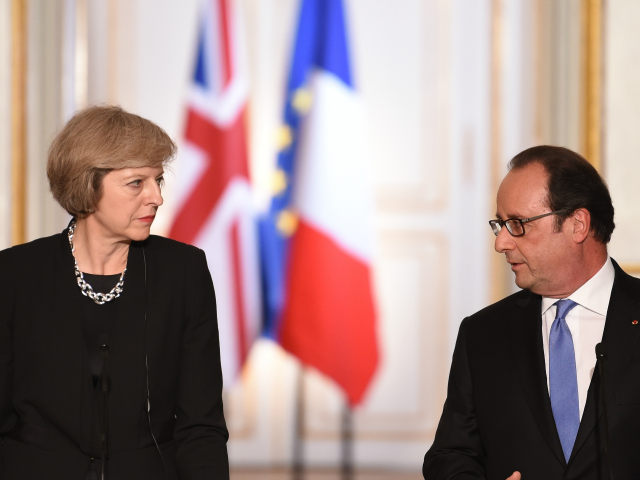(AFP) – French President Francois Hollande on Thursday told Britain it would have to choose between access to the single market and the free movement of people when it begins its negotiations on leaving the European Union.
The French leader accepted Britain’s right to delay formal exit talks, but described the timing of its departure as “the sooner the better”, following the country’s shock vote to leave last month.
“It’s the most crucial point… Britain will have to choose: stay in the single market and accept free movement or have another status,” he said without elaborating on the latter option.
Speaking after talks in Paris with British Prime Minister Theresa May, Hollande took a tougher line than German Chancellor Angela Merkel a day earlier in Berlin.
“The United Kingdom has decided to leave the European Union. It’s their choice, it’s their responsibility and we respect that decision…. There can be no discussions, no pre-negotiation before the negotiation,” Hollande told a joint news conference with May.
On the timing for the talks, Hollande acknowledged that Britain would need time to prepare a negotiating position.
“There can be preparations for this negotiation,” he said.
“But I repeat. The sooner the better, it’s in the common interest, of Europe, the United Kingdom, and our economies,” he added.
– ‘Encouraging resilience’ –
May said she was committed to achieving a deal that reflected the sentiments expressed by most Britons in the June 23 referendum.
“The message the British people gave in their vote for the UK to leave the EU had a very clear message: that we should introduce some controls to the movement of individuals from countries in the European Union into the UK.
“I’m clear the government should deliver, and will deliver on that for the British people.
“But we also want to get the right deal on trade in goods and services,” she said, calling it a matter of importance to both Britain and its EU partners.
May arrived in Paris a day after meeting Merkel in Berlin.
The Conservative leader repeated what she told Merkel, namely that she would not trigger the two-year EU exit process “before the end of the year”.
Brexit aside, she and Hollande were at pains to emphasise the entente between their countries.
A week after the massacre in Nice, May said Britain stood “shoulder to shoulder” as “a great ally and friend”, while Hollande said Franco-British ties “will never come undone”.
Britain’s vote to leave the European Union sent shockwaves through the global economy and sparked political turmoil at home.
European Central Bank chief Mario Draghi struck a reassuring tone, however, in remarks following the ECB’s regular policy-setting meeting.
“After the UK referendum, euro area financial markets have weathered the spike in uncertainty and volatility with encouraging resilience,” Draghi said.
On Wednesday, speaking on her first foreign trip since taking office in the wake of the seismic vote, May told Merkel that her government planned on a “sensible and orderly departure” from the EU.
Merkel, who is expected to play a pivotal role in the Brexit talks along with France, said it was in the interests of all that Britain had a “well-defined position” before the talks began.
The Brexit talks are expected to hinge on Britain’s desire to restrict immigration by EU citizens but still retain vital access to the EU’s single market.
In the UK, EU immigration was the most hotly-debated issue of the referendum campaign.
Brexit campaigners argued that the hundreds of thousands of EU immigrants arriving in Britain every year have pushed down wages for low-paid Britons and overburdened public services.
– ‘Unique concerns’ –
Earlier Thursday, Hollande held talks in Dublin with Irish Prime Minister Enda Kenny.
In a joint statement with Kenny he said there should be “a balance of rights and obligations, including in respect of the four freedoms”, referring to the free movement of goods, services, capital and people in the EU.
Ireland’s concerns revolve mainly around the future of its lucrative exports to Britain and its border with British-ruled Northern Ireland, which would be the EU’s only land border with Britain once it has left.
“Ireland and France are the UK’s nearest neighbours, with significant and complex economic, human, cultural and historical links,” Kenny and Hollande said.
“In consequence, both countries have specific and indeed unique concerns to be addressed in future negotiations,” they said.
Britain on Wednesday took the first step towards Brexit by announcing it was relinquishing its six-month EU presidency which had been due to start in July 2017 and will be taken up by Estonia instead.

COMMENTS
Please let us know if you're having issues with commenting.